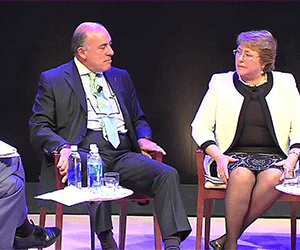
Ford Foundation-ILO High level event: "Employment and Decent Work for Inclusive and Sustainable Development"
In the context of the 69th Session of the UN General Assembly, this high-level event brought together Heads of State and Government from developed and emerging economies with key actors of the real economy to discuss the role of Employment and Decent Work in the post-2015 development agenda.
As progress towards a new set of global development goals gains momentum, creating decent and productive jobs is emerging as an urgent priority. World leaders and decisions makers, senior government and U.N. officials, top business executives and trade unionists need to explore new ways forward in order to ensure that economic growth is more inclusive and policies effective in promoting the creation of fair and decent work.
Job creation is one of the most pressing challenges of our times and will continue to be beyond 2015. It is estimated that from 2015 to 2030 the global economy must create 670 million jobs to contain the current spread of unemployment and cope with the growth in the working age population. And this number will be substantially increased if women’s participation in the work force were increased from current rates.
The global youth unemployment rate is almost three times higher than adult unemployment and in some countries it exceeds 50 per cent, which threatens to tear the social fabric and leave long-lasting scars on an entire generation. A particularly worrying problem, in the countries for which information exists, is the proportion of young people neither in employment, nor in education or training (NEET) which has continued a steep upward trend since the start of the crisis. In certain countries, almost one-quarter of young people aged 15 to 29 are now NEET.
The quality of jobs, not just the quantity, is also at stake. Of those who are employed in the global economy, one-in-two are in vulnerable employment; while nearly one-in-four workers and their families live on less than US$2 a day. In developing countries, the majority of workers have no access to social protection. Furthermore in most countries, developing and developed, income inequalities have widened.
“Employment and Decent Work for All” has been recognized by Member States as a priority area in the sustainable development agenda and a critical driver to promote social inclusion and reduce inequalities, as well as vital to enhancing economic growth and a smooth transition to sustainable development.
In the Rio+20 outcome document, “The Future We Want”, the importance of creating an enabling environment for full employment, decent work for all and social protection was widely recognised. The document urged all governments to adopt forward-looking macroeconomic policies to promote decent jobs and more equitable and inclusive societies.
The Open Working Group on Sustainable Development Goals has identified “Employment and Decent Work for All” as a core focus area to be considered in the future development framework. This includes possible targets in the areas of social protection floors, decent wages, small- and micro-enterprises, the transition from informal to formal employment, youth employment issues, gender discrimination, inclusion of people with disabilities and protection of the rights of migrant workers, among others.

